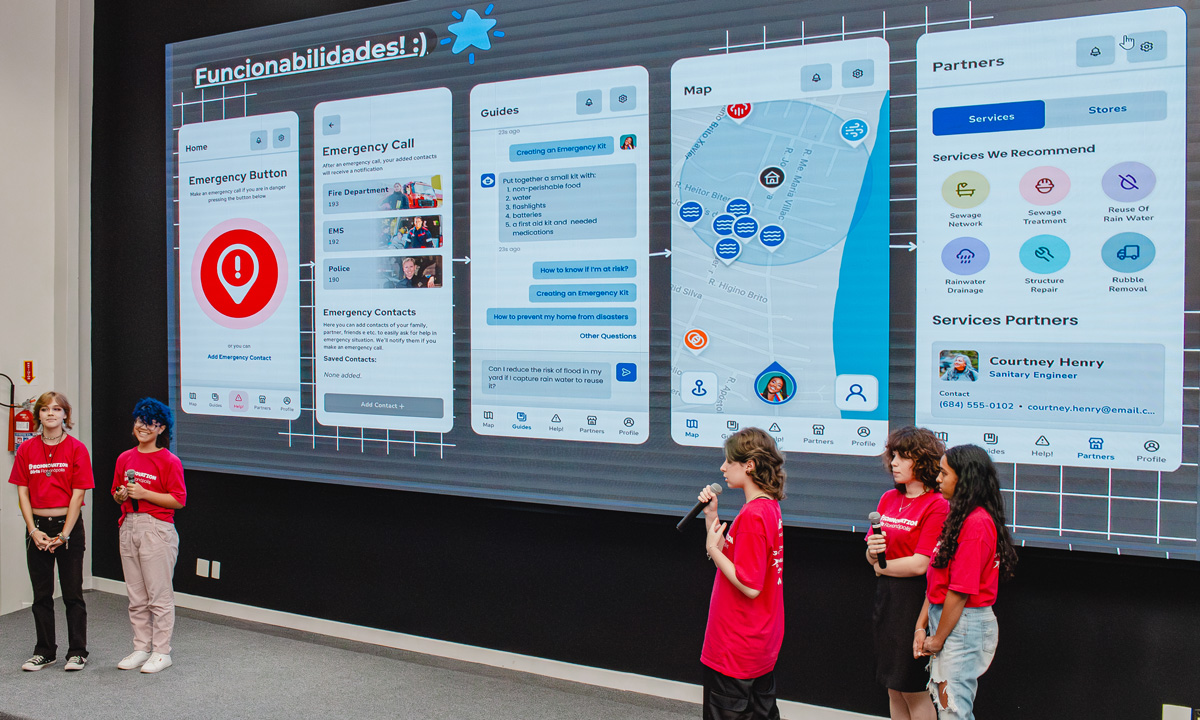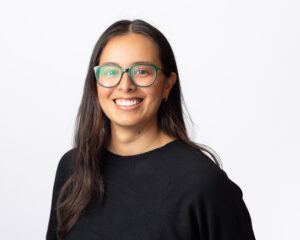Global Nonprofit Challenges Girls to Solve Real-World Problems With AI
For more than 15 years, Technovation has increased the number of girls involved in STEM education through an international mobile app competition.

Get stories like this delivered straight to your inbox. Sign up for The 74 Newsletter
Correction appended Jan. 7
As the oldest daughter of six, Vanessa Tostado always felt pressure from her immigrant parents to succeed in school.
She enrolled in Eastside College Preparatory School in East Palo Alto, California, which helps first-generation students enroll and earn a degree. She fostered her passion for STEM by taking science classes and participating in national math competitions.
But during her sophomore year, Tostado hit a roadblock. Her computer science class became so difficult that she asked her vice principal if she could withdraw. She was one of the few female students enrolled, and though computers were a field she was interested in pursuing after high school, she struggled with assignments while her classmates thrived.
“Before we could leave class, we would have these sort of exit slips to solve a problem. I just remember this dreadful feeling of, ‘I don’t know how to do this. I’m stuck.’ And this is your exit ticket to go to lunch and all my peers are leaving,” she said. “I was really feeling like this is not for me, like I’m just not getting it.”
Tostado credits Technovation, an international tech education nonprofit, for getting her back on track while reinvigorating her passion for STEM. The organization connects girls ages 8 to 18 with mentors who help them learn about coding, artificial intelligence and entrepreneurship in order to create mobile apps that address real-world problems.
“In high school, I had a very fixed mindset of, ‘I can’t do it. It’s not for me.’ Through the mentorship that I had in Technovation, that really sort of shifted,” Tostado said. “It’s not that I can’t do it, I just don’t know how to do it. And I need to figure out what I don’t know how to do, and what questions I need to ask to help me get there.”

Since 2006, Technovation has served more than 150,000 girls around the world, mostly through a free, annual international competition that challenges participants to find a problem in their community and build a mobile or web app to help solve it.
The organization has a network of chapters that work with mentors, volunteers and parents to help individual girls, or teams of up to five, create their projects over a period of several weeks. Last year, Technovation received more than 2,000 competition submissions from 7,500 girls.
Tara Chklovski founded Technovation, formerly named Iridescent, after witnessing the lack of women in STEM fields while working on a doctorate in aerospace engineering at the University of Southern California. It was a stark difference from her bachelor’s degree program in India, which had equal representation of men and women.
“There were two or three women in (my) entire Ph.D. program. So then you begin to notice, and you’re like, ‘Why is that?’ ” Chklovski said. “I think the thing that really surprised me was that women would sort of say with pride, ‘Oh, I don’t do math. I’m bad at math.’ And I’m like, ‘Why is that something that you’re saying so proudly?’ You don’t say, ‘I’m bad at reading, I can’t read a book.’ I think that was bothering me.”
A new international study from the American Institutes for Research shows that by age 6, kids already perceive boys to be better than girls at computer science and engineering. Among girls, such beliefs only grow more entrenched over time.
Chklovski left her doctorate program to create a nonprofit of her own. She eventually founded Technovation, which began as a school-based STEM program but shifted to serving girls internationally in 2010. The nonprofit launched its global competition in 2012 and has since focused on increasing women’s representation in technology industries, including artificial intelligence.
This year, Technovation formed a collaboration with UNICEF, Google and other companies called the AI Forward Alliance, which provides government agencies and nonprofits around the world with guidance on how to incorporate artificial intelligence education into their own mission and work.
Technovation is “calling upon the world and other countries’ governments to help close the gender gap” in technology and STEM industries,” according to the organization. Chklovski said the alliance’s goal is to educate 25 million girls in the next 15 years.
In Technovation’s competition, girls identify issues in their communities, build mobile app prototypes to offer solutions and create business plans, complete with a pitch and video, to be judged. The projects go through a round of semi-finals before the finalists are flown to Silicon Valley to pitch their projects in person.
Tostado hadn’t heard about Technovation until after her struggles began as a sophomore in 2013. When a mentor at her after-school program proposed that Tostado and some of her friends participate in the competition, she was hooked — especially after learning that she could help her own community in the process.
For three months, working on their own time outside of class, Tostado’s team focused on creating an app called Tag It, which aims to improve their local neighborhood by notifying residents of graffiti and helping to organize events to clean it up.
“The idea was, essentially, build an app that lets people say, ‘I am going to create an event to paint over the graffiti at the public library.’ And then, if someone is feeling like they want to volunteer, they can join that,” she said. “The idea was getting people to work together to help clean up East Palo Alto.”
Technovation also encourages a focus on climate solutions for project submissions. One girl in India built an app that would tell users their risk of getting lung cancer from air pollution in their community. A team from Argentina created an artificial intelligence app that predicted the chance of wildfires in specific areas.
“These young women are still in school, right? They are creating real solutions to solve real problems,” Chklovski said. “But then, as they become alumni and they go into the workforce, they continue with that — they have that mindset to solve problems.”
The Tag It app ranked among the top 20 projects judged in the Technovation competition that year. While the app didn’t win the entire challenge, Tostado said the education and mentorship she received from the nonprofit — which continued throughout her high school career — helped her rediscover her passion for STEM.
“I’m coming from a place of like, I can’t solve this exit ticket — and I have to scarf my lunch down my throat to get to my next class — to this confidence of [being] able to create this app,” Tostado said. “I think that mentorship and experience gave me the confidence to continue with my classes in high school and then continue taking classes in undergrad.”
Tostado graduated from Eastside in 2015 and enrolled at Wesleyan University in Middletown, Connecticut, where she earned a bachelor’s in 2019. She then landed a software engineering job at Palo Alto Networks, a multinational cybersecurity firm.
Throughout college, Tostado said, she noticed there was still a lack of women in STEM programs. At conferences, she was told she was “stepping into something that’s not the norm.” Tostado is currently the only woman on her team of 10 engineers.
“I don’t feel like my team treats me any less than, and I feel like my opinions are heard, but I can definitely understand that might not be the norm everywhere,” she said. “But it’s also one of those things, like, you don’t know what you don’t have until you have it, right? Maybe in the future, I join a team and there’s a woman manager, or there are more women on the team, and I’m like, ‘Whoa. This is what I’ve been missing.’ ”
Correction: The Eastside College Preparatory School graduate’s last name is Tostado.
Get stories like these delivered straight to your inbox. Sign up for The 74 Newsletter

;)
